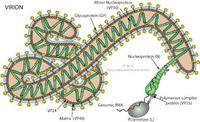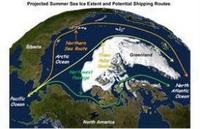-
Gun manufacturers take action against states which passed tough gun laws
Gun manufacturers are starting to push back against strict gun laws in some states by refusing to sell their products to law enforcement agencies in these states, or to employees of these agencies. So far, more than 110 specialty manufacturers of firearms have joined the movement, which calls itself the Firearm Equality Movement.
-
-
Grid-scale batteries for storing renewable energy have large carbon footprint
Most of the electricity produced in the United States comes from coal- and natural gas-fired power plants. Only about 3 percent is generated from wind, solar, hydroelectric, and other renewable sources. A key problem is that the U.S. electrical grid has virtually no storage capacity, so grid operators cannot stockpile surplus clean energy and deliver it at night, or when the wind is not blowing. Stanford scientists have developed a novel way to calculate the energetic cost of building large batteries and other storage technologies for the electrical grid. The found that the fossil fuel required to build these technologies could negate some of the environmental benefits of installing new solar and wind farms.
-
-
U.S. arms sales, security partnerships to suffer as a result of sequestration cuts
One area where sequestration-mandated budget cuts will be felt sooner rather than later is U.S. support for foreign militaries in Europe, Asia, and the Middle East. Training and security partnership engagements with allies will likely decline as well as the Defense Department must now operate with a $46 billion cut in its budget for fiscal 2013.
-
-
Tech companies, telecoms clash over cybersecurity executive order
Last August a cybersecurity bill died in Congress amid partisan bickering. On 12 February this year, President Obama packed many of that bill’s elements into a cybersecurity executive order. To make the order more acceptable to some of its congressional and industry critics, the president introduced an exemption which would take large technology companies off the list of companies subject to the new cybersecurity standards. This exemption placated some of the original cybersecurity bill’s critics, but angered others, chief among them telecommunication companies.
-
-
Marburg drug shows promise

Marburg hemorrhagic fever is a severe and highly lethal disease with no effective treatments, and it has been classified as a Category A bioterrorism agent by the Centers for Disease Control and Prevention (CDC). Sarepta Therapeutics announced positive results from a non-human primate study of AVI-7288, the company’s lead drug candidate for the treatment of Marburg virus infection.
-
-
Precious metal recovery technique ideal for rare Earth elements purification
Researchers have come up with a new approach to make the recovery of high value precious metals faster and more economically viable. The new technique could be ideal for the purification of rare earth elements, which are vital commodities for ‘green’ technologies such as hybrid cars and novel batteries.
-
-
Coal and U.S electric power generation

Coal is an important fuel source in the United States today. Responsible for approximately 39 percent of the country’s electrical generation, coal is vital to the day-to-day operation of people’s lives. The United States is rich in coal deposits, with large resources. One of the most important and largest of those deposits is found in the Powder River Basin (PRB) of Wyoming and Montana, which, in 2012, produced more than 42 percent of the nation’s coal.
-
-
TSA would allow knives on planes beginning 25 April
The Transportation Security Administration (TSA) yesterday announced that, starting 25 April, the prohibition against carrying knives on board would be lifted. TSA would also allow other items banned since 9/11, such as lacrosse sticks, ski poles, and small, souvenir baseball bats. The flight attendants union was quick to condemn to move, calling the decision “dangerous” and “designed to make the lives of TSA staff easier, but not make flights safer.”
-
-
U.S. nuclear industry resists stricter, post-Fukushima safety measures
Since the March 2011 Fukushima disaster, members of the Nuclear Regulatory Commission (NRC) have been debating whether or not to impose even stricter safety measures on the thirty-one U.S. boiling water reactors (BWRs). Utility companies have been fighting any new safety regulations, arguing that the security measures they have are more than enough.
-
-
New source for rare earth elements: discarded consumer products
In a new twist on the state’s mining history, a group of Idaho scientists will soon be crushing consumer electronics rather than rocks in a quest to recover precious materials. Two national labs in the state will apply expertise gained in recycling fissionable material from nuclear fuel to separate rare earth metals and other critical materials from crushed consumer products.
-
-
World’s first zero emission sports car is built-at-home electric car

A new partnership has developed the world’s first build at home electric race car kit, an all-electric sports car designed and engineered to support a growing demand for zero emission racing vehicles. The iRacer kit, available from £13,999, can be transformed quickly between hybrid, pure electric, or internal combustion engines.
-
-
Enabling small ships to launch and retrieve long-endurance UAVs
About 98 percent of the world’s land area lies within 900 nautical miles of ocean coastlines. Enabling small ships to launch and retrieve long-endurance UAVs on demand would greatly expand the U.S. military’s situational awareness and ability quickly and flexibly to engage in hotspots over land or water. DARPA is seeking companies to develop these systems.
-
-
New ways to store data securely with untrusted cloud providers
Cloud storage security is an especially important issue for anyone dealing with large amounts of data that are supposed to be stored for a long period, such as archival and backup data. Researchers received a top honor for their ideas on better ways to ensure the integrity and long-term reliability of data stored at potentially untrusted cloud storage providers.
-
-
Global warming opening new shipping routes in Arctic Ocean

The Arctic Ocean has captured the imagination of explorers because of the possibility it offers for traveling between the Pacific and the Atlantic oceans through the Bering Strait. Until recently, however, sea ice has blocked access to the potential shortcut between Asia and North America or Europe. In the past two years, the ice has begun to melt in late summer to such an extent that even ordinary seagoing vessels have been able to enter its frigid waters. For vessels traveling between Rotterdam in the Netherlands and Yokohama, Japan, the Northern Sea Route is approximately 40 percent shorter than the traditional route through the Suez Canal.
-
-
Police budget cuts a boon to private security picks
In cities across the United State, local law enforcement, facing deep budget cuts, has had to do more police work with fewer officers. New Jersey alone lost 4,200 officers between 2008 and 2011. The reduction in police force has been a boon to the U.S. private security industry, which is expected to earn more than $19 billion by 2016.
-
More headlines
The long view
Factories First: Winning the Drone War Before It Starts
Wars are won by factories before they are won on the battlefield,Martin C. Feldmann writes, noting that the United States lacks the manufacturing depth for the coming drone age. Rectifying this situation “will take far more than procurement tweaks,” Feldmann writes. “It demands a national-level, wartime-scale industrial mobilization.”
Trump Is Fast-Tracking New Coal Mines — Even When They Don’t Make Economic Sense
By Katie Myers
In Appalachian Tennessee, mines shut down and couldn’t pay their debts. Now a new one is opening under the guise of an “energy emergency.”
Smaller Nuclear Reactors Spark Renewed Interest in a Once-Shunned Energy Source
By David Montgomery
In the past two years, half the states have taken action to promote nuclear power, from creating nuclear task forces to integrating nuclear into long-term energy plans.
